Yet little over twenty years ago this area was a hotbed of traditional music-making and country entertainment, where every village had its group of musicians and singers, often travelling around the many pubs where music was made. ![]() As Arthur Hewitt says of Blaxhall Ship, perhaps the most musical of all the pubs, "They got Wicketts Richardson (sound clip) to keep order and he'd say "Sing, say, or pay for a gallon of beer" - and you could go round that pub and every one would have a go - not many paid". However, since the War, radio, then television have made manufactured entertainment readily accessible. With the break-up of the old village structure and the closure of an enormous number of country pubs, such music-making has declined to a mere shadow of its former abundance. A great many of the old musicians and singers have died, never to be replaced.
As Arthur Hewitt says of Blaxhall Ship, perhaps the most musical of all the pubs, "They got Wicketts Richardson (sound clip) to keep order and he'd say "Sing, say, or pay for a gallon of beer" - and you could go round that pub and every one would have a go - not many paid". However, since the War, radio, then television have made manufactured entertainment readily accessible. With the break-up of the old village structure and the closure of an enormous number of country pubs, such music-making has declined to a mere shadow of its former abundance. A great many of the old musicians and singers have died, never to be replaced.
My own interest in the area began in the late sixties when I heard a batch of recordings of the local singers at Blaxhall Ship made in 1953. 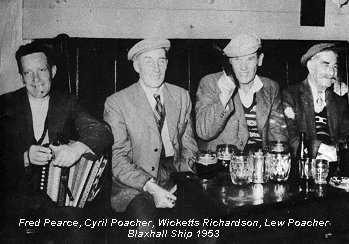 I had been an ardent collector of blues records while at school and my interest quickly developed to include American country music and then Irish music. On buying the Topic 'Folksongs of Britain' set of records I stumbled on a track of Cyril Poacher singing The Nutting Girl. "Great" I thought, and a bit more delving uncovered tracks by Bob Scarce, Wicketts Richardson and John French. It has always been a big regret that while I was listening to music from the Appalachian Mountains and the Mississippi Delta there existed, not two hours away, a rich and interesting musical tradition, virtually unrecorded. Had I begun recording then, we might now be able to listen to the music of such masters as Walter Clow, Stan Seaman and Walter Gyford.
I had been an ardent collector of blues records while at school and my interest quickly developed to include American country music and then Irish music. On buying the Topic 'Folksongs of Britain' set of records I stumbled on a track of Cyril Poacher singing The Nutting Girl. "Great" I thought, and a bit more delving uncovered tracks by Bob Scarce, Wicketts Richardson and John French. It has always been a big regret that while I was listening to music from the Appalachian Mountains and the Mississippi Delta there existed, not two hours away, a rich and interesting musical tradition, virtually unrecorded. Had I begun recording then, we might now be able to listen to the music of such masters as Walter Clow, Stan Seaman and Walter Gyford.
After this first insight into Suffolk music, I resolved to visit Blaxhall and see whether anyone still remembered any of these old chaps or if indeed anyone still played or sang the old songs. One Tuesday during my holidays I hitch-hiked up to Blaxhall and arrived after a four mile walk at the Ship just on opening time in the evening. My first collecting trip was not a success. Very conscious that I was a stranger, I did not pluck up enough courage to ask many relevent questions, and those I did ask were met either with blank stares or long diatribes on the Spinners by the handful of other drinkers in the pub, who I realise now were only visitors themselves. So I settled down in a corner and got stuck into the local beer, which was very mild, very cheap, and very strong. Three hours later, all thoughts of traditional music a million miles away, I left the pub, thumbed a lift to the main road and somehow got home.
It was another two years before I visited Blaxhall again. I met Percy Webb, that fine singer, at the Loughborough Folk Festival and arranged to visit and record some songs. On learning that he lived in Tunstall, I remembered walking through there on my previous visit to Blaxhall. 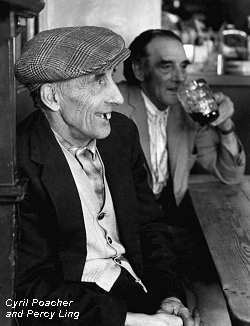 I spent a pleasant Saturday afternoon with Percy and asked him about the old Blaxhall singers that I had heard of. Yes, he had known quite a few of them and thought that Cyril Poacher was still alive, but that apart from Bob Hart, Percy was really the only one left singing the old songs. (It must be said that nearly every singer tells you this.)
I spent a pleasant Saturday afternoon with Percy and asked him about the old Blaxhall singers that I had heard of. Yes, he had known quite a few of them and thought that Cyril Poacher was still alive, but that apart from Bob Hart, Percy was really the only one left singing the old songs. (It must be said that nearly every singer tells you this.)
On leaving Percy's I wandered down to the Ship, about three miles away, and arrived just on opening time. Being a Saturday the place soon filled up and at about 8 o'clock the door opened and to my amazement an old man of about 90 with white hair and a long sharp nose struggled in and sat at the nearest seat. A beer was immediately sent over to the man whom I recognised from an old photograph as Bob Scarce. Hardly able to believe it, I sat and chatted with him for a while about his songs, which amused him greatly, and he informed that the chap I was standing next to at the bar was Fred Pearce, who was for many years the local melodeon player and had also recorded in the fifties. I spoke at length to Fred, then a little deaf, about the old days, and he told me that Cyril Poacher and Wicketts Richardson still lived in Blaxhall and to come back tomorrow lunchtime and he would introduce them to me.
By now an accordeon player with a big new button accordeon had arrived and proceeded to play singalong pub songs. During a break I bought him a beer and found that he lived in Framligham. I had heard of a singer from there called Harry List, so I asked if he'd ever heard of this singer. After nearly choking on their beer, he and his friends told me they had indeed heard of Harry List - I was talking to his son Fred!
After a cold night sleeping in a van in the car park, I returned the next lunchtime as agreed and spent two hours talking and drinking with Cyril, Wicketts, Bob Scarce, Geoff Ling and Fred Pearce about old times, music and singing, and it became obvous to me that, far from having died out, there was still an active musical tradition not only in Blaxhall, but in the whole area locally; I decided then and there to document as much of it as I could.
The account which follows derives almost entirely from conversations with musicians and singers themselves, undertaken over the last several years or so. Most still live(d) in or near the village which they describe, but a few such as George Ling, Jock Hardwick and Alex Bloomfield have now to be sought further afield. During my first few visits I didn't own a tape recorder and so what appears here is based on detailed notes made at the time. I also received several very informative letters which are reproduced as written. Otherwise I have transcribed taped conversations and then edited and arranged the material to form a coherent narrative. Most chapters begin with a brief introductory paragraph by me. Elsewhere in the text editorial comments are in brackets. A detailed list of those whose words appear is given at the end of each chapter together with the place with which they are associated, followed by the place where they are now living if this is different. Also listed at the end of each chapter are items recorded by performers from the area featured in the chapter. Except in the case of material recorded by me for Topic Records, but as yet unissued ('KS/Topic unissued'), virtually all these recordings are publicly available in one form or another. The full titles of the commercial recordings appear in Chapter 11.
I am very grateful to all those who have helped in the production of this survey. In addition to those mentioned in the text, the sincere interest and co-operation of Jack Saunders (Blaxhall Ship) and Bernie Parry (Worlingworth Swan) has been of inestimable help. Mike Yates, Tony Engle, Ginette Dunn, Royston Wood, Iris Williams, Taffy Thomas and Jeannie Harris have given me much help, encouragement and hospitality. I am of course responsible for any errors which appear and I would be grateful for any comments, additions or corrections which readers may have.
All the performers included here seem to me to belong to the same musical area both geographically and socially, but two other great singers associated with the area, Bob Roberts (for many years of Pin Mill, now living in the Isle of Wight) and Phoebe Smith (of Kentish gypsy stock, now living near Woodbridge) have been deliberately excluded as belonging to separate musical traditions. I have also not concentrated on the well-known singers Percy Webb and Bob Hart because they have already received excellent coverage elsewhere by other writers. (See Bob Hart double CD booklet notes)
 However this small farming community commands a vital and possibly unique position in our knowledge of English traditional music.
However this small farming community commands a vital and possibly unique position in our knowledge of English traditional music.
When Peter Kennedy made his famous recordings in the Blaxhall Ship in 1953 he uncovered, albeit only superficially, a living tradition of music making, the roots of which stretch way back beyond living memory. The singers and musicians he encountered were not reviving half-forgotten songs from their youth for the "man with the microphone", but taking part in the recording of their normal Saturday night entertainment at the pub. This does not make Blaxhall special - had Kennedy gone to Brundish Crown, Dennington Bell or Darsham Fox he would probably been able to record a similar event. What places Blaxhall above these others is the sheer volume and quality of performance found. Why Blaxhall? I don't really know - possibly the strong influence of the Smith family of gypsies who often stayed and settled there; possibly the predominance of the small number of large families - the Lings, Woolnoughs and Leeks amongst them - who frequently intermarried and often passed down their songs within their families; possibly the fact that the pub has always been kept by conservative men with a genuine love for the music. All I do know is that people who come from Blaxhall are very proud of the fact and are fully aware that their village is something just a little extraordinary.
I've always remembered there being singing in that old pub. When I was just a boy I could hear those old Ling brothers sitting there singing one against the other and getting riled over it too. "You don't know that one proper" they'd say, or "Blast, I can beat that Billy". Just after I took it they got Wicketts (Alf Richardson) to keep order and he'd say "Sing, say or pay for a gallon of beer" - and you could go all round that pub and every one would have a go - not many paid. People would come from all over to see us - we used to have cockneys down every year and they loved it.
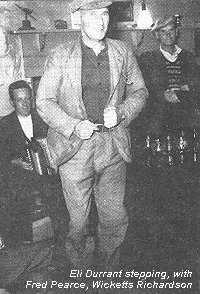 The popularity of it in Blaxhall would seem to stem from the large gypsy families - the Smiths, Taylors and Diapers - who lived locally, and the abundance of good musicians. In addition, there was a more formal dance, the Candlestick Dance, performed over a lighted candle. This was last performed about 20 years ago by Bob Scarce's sister Rose.
The popularity of it in Blaxhall would seem to stem from the large gypsy families - the Smiths, Taylors and Diapers - who lived locally, and the abundance of good musicians. In addition, there was a more formal dance, the Candlestick Dance, performed over a lighted candle. This was last performed about 20 years ago by Bob Scarce's sister Rose.
Christmas time was lovely there. We'd never get home much before New Year - we'd sleep in Fred's caravan - they wouldn't let us go. They were real rough diamonds - the most hospitable people I've ever met. They had hearts as big as dartboards. I used to play all those hornpipes - Sailor's Hornpipe, that one on the record (Yarmouth Breakdown), Turkey in the Straw - I learnt that off a Yank in Woodbridge. I like to couple tunes together - it's easy 'cos the rhythm sticks. When those Smiths danced they'd go one against the other for 40 or 45 minutes so you couldn't keep going on one tune - it'd be too monotonous. And if you went wrong, blast, you'd get swore at.
(Although Eely and Spanker are well remembered at the Ship, the fiddle was not the normal music for dancing. The most popular instrument was undoubtedly the melodeon.)
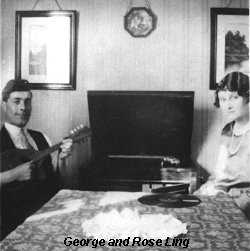 And he made dancing dolls - he'd stick a meat-skewer in the fire, cut the wood out to make the legs and body, and put wire through them and put the skewer through its little tummy. Then he'd sit it on a board and tap it. It'd dance like anything and he'd sing "Gawd bless your heart when your legs fly up!" Mum and Dad would go down the Ship at night and me and sister Glad, they'd leave us with him and we'd say "Come on, Grand-dad, get your accordeon out", and he'd play all night. He was a clever old man.
And he made dancing dolls - he'd stick a meat-skewer in the fire, cut the wood out to make the legs and body, and put wire through them and put the skewer through its little tummy. Then he'd sit it on a board and tap it. It'd dance like anything and he'd sing "Gawd bless your heart when your legs fly up!" Mum and Dad would go down the Ship at night and me and sister Glad, they'd leave us with him and we'd say "Come on, Grand-dad, get your accordeon out", and he'd play all night. He was a clever old man.
There used to be an accordeon in every house those days. I used to play one a lot. When I moved to Croydon (in 1926) we went to Hastings and I took it on the coach. Well, we got in a pub and I played all day - everyone was polka-ing and doing Knees up Mother Brown. Well, I got fed up and as we left I kicked it under the table and left it there. I've never played one since.
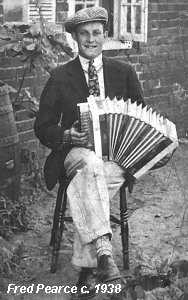 They always had a regular accordeon player there - George Leek when I first went, then Fred Pearce, Bob Melton (from Campsea Ashe), Fred List, then Oscar Woods.
They always had a regular accordeon player there - George Leek when I first went, then Fred Pearce, Bob Melton (from Campsea Ashe), Fred List, then Oscar Woods.
(As mentioned, there were several good accordeon players at Blaxhall then, but as time went on Fred established himself as the regular musician playing for singing (his repertoire included many traditional songs), stepping and polkas, known locally as "froggin' rounds".)
(Fred married into the large Smith family, his wife Violet being the sister of the late Arthur Smith, a very highly rated local singer. Fred did a bit of stepping himself, but preferred playing, and is generally considered to have been the best player around. "He always kept the old rhythm" they say - apparently no matter what, for several people remember an occasion, one Christmas, when a terrific brawl broke loose in the Ship and all the windows were smashed out while Fred continued to play, holding his accordeon on the top of his head to avoid the flying chairs and tables!)
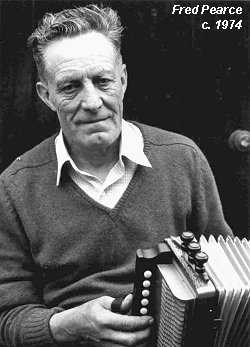 I used to go by bike or bus mainly. I've played in Darsham Fox with Ernie Seaman and Woodbridge a lot. There was an old chap there called John Fevyer and he was a champion step-dancer. He was about 80 then (c. 1930) and he had a long overcoat and a big walking stick and in the evening he'd listen outside the pubs to hear if there was any music going on. If there was, he'd go in and step straight away - it was his whole life. He told me that when he was young, some pubs had cellars and they'd hold step-dancing competitions there. The judges would sit in the cellars, so they couldn't see who was dancing, and they'd pick the best just by hearing them dance up above. I've seen a man in the Boat (in Woodbridge) stand on his head - no hands - and play a concertina and step-dance on the ceiling - that's the truth!
I used to go by bike or bus mainly. I've played in Darsham Fox with Ernie Seaman and Woodbridge a lot. There was an old chap there called John Fevyer and he was a champion step-dancer. He was about 80 then (c. 1930) and he had a long overcoat and a big walking stick and in the evening he'd listen outside the pubs to hear if there was any music going on. If there was, he'd go in and step straight away - it was his whole life. He told me that when he was young, some pubs had cellars and they'd hold step-dancing competitions there. The judges would sit in the cellars, so they couldn't see who was dancing, and they'd pick the best just by hearing them dance up above. I've seen a man in the Boat (in Woodbridge) stand on his head - no hands - and play a concertina and step-dance on the ceiling - that's the truth!
(Fred stopped playing regularly about 1960 but despite going slightly deaf, would occasionally relieve either Fred List or Oscar Woods and play extremely well right up to his sad and sudden death in 1975. Fred was the first person I really got to know in Blaxhall and both he and his wife have helped no end - my thanks.
Step-dancing in the Ship is still continued - mainly by Geoff Ling and Kenser Diaper (Obediah Taylor's grandson) and some of his relatives, especially when Oscar brings his box.)
I used to go bellringing too, when I was a youngster, with three Smith brothers - Bill, George and Arthur - Hub Smith as we called him. He was a churchwarden and he used to sing Kitty Wells and The Larks they Sang Melodious - he had a lovely mellow voice that man. Fred Ling - Fish we called him - he was my half-cousin. He was old fisherman from Snape. He sang Nancy of Yarmouth and The Dark Eyed Sailor. He learnt that from his father, Jimmy Ling. George Messenger was good too - he used to sing Barbara Allen and Jack is Come Home from the Sea. 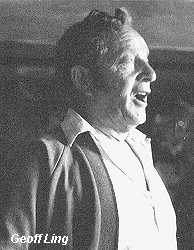 My father, Oscar, could sing too - not as much as Aaron though. I've heard father sing that one Australia - that's where I got it. One night he went to Farnham George and on the way home he fell in a ditch and when he woke he'd lost all the rims off his ears through frostbite.
My father, Oscar, could sing too - not as much as Aaron though. I've heard father sing that one Australia - that's where I got it. One night he went to Farnham George and on the way home he fell in a ditch and when he woke he'd lost all the rims off his ears through frostbite.
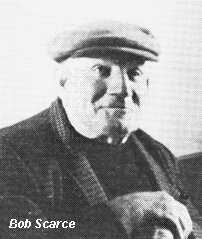 We knew them because we'd heard them so many times.
We knew them because we'd heard them so many times.
(Bob Scarce's real name was Alex. He was born on 8 June 1885 in Blaxhall but lived for 25 years in Snape between the War years. Until his death in 1974 he was the oldest man living in Blaxhall who had been born there.
Although I had met and spoken to Bob on my first night in The Ship, it was to be several months and three or four more visits before I heard him sing. Friday nights had now become favoured for singing and music sessions, and one beautiful July evening the atmosphere in the pub was quite special. Nearly all those present were locals and Geoff Ling's brother George was on a visit from Croydon, which prompted the exchange of pleasant memories from the past, and the creation of the right circumstances for 'a good sing'. George, Geoff and Cyril had already sung, and sung well to good order, when George asked Bob Scarce to sing. Now Bob was nearly 90 and extremely frail, and I must confess I was a bit doubtful as to whether this was a good move by George. But as Bob struggled to his feet, his hands firmly gripping his walking stick, the pub fell silent and Bob sang, almost in a whisper:
... and gently coaxed and prompted by the company, his singing grew in confidence. The sight and presence of this old man, standing by the pub door as the last of the evening sunlight streamed into the bar, singing:
... has stayed with me to this day.
I consider Bob Scarce to have been one of England's greatest traditional singers. His style was hugely idiosyncratic, immediately recognisable, and yet firmly within the declamatory Blaxhall tradition. A glance at his discography (below) reveals a repertoire of magnificent songs and striking ballads, and yet his most popular song was Paddy and the Rope, about two hapless would-be church robbers. I would guess I heard Bob sing this on three occasions, and each time, Fred List's brother Billy, who accompanied the Framlingham crowd, was there. A few months later I heard Billy List sing Paddy and the Rope in Dennington Bell - after which he turned to me, winked, and said "Got it in the end". Today, the fine singer Tony Harvey from Tannington sings Paddy and the Rope, learned in precisely the same way - from Billy List. A lively tradition!)
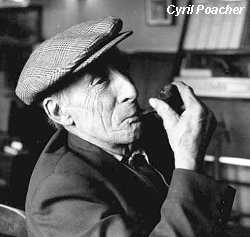 He'd do The Barley Mow - I can sing that too. I first started singing when I was eight. My grandfather Cronie Ling would put me on his knee and sing The Nutting Girl - that was the first song I heard, and he used to let me smoke his pipe too. Young Man from the Country - he did that too. I got A Wager from my mother Susan Ling - she sang that down the Ship. Spencer Leek was another good singer - his name was George, the same as his son. He was engineer down the Maltings when I knew him but he'd been in the merchant navy. He used to wear a peaked cap and stand at the door of the pub until he heard Wicketts call on him to sing. "Good Old 71" they'd shout. He'd sing I've a Brace of Dogs and an Airgun Too and Captain Ward
He'd do The Barley Mow - I can sing that too. I first started singing when I was eight. My grandfather Cronie Ling would put me on his knee and sing The Nutting Girl - that was the first song I heard, and he used to let me smoke his pipe too. Young Man from the Country - he did that too. I got A Wager from my mother Susan Ling - she sang that down the Ship. Spencer Leek was another good singer - his name was George, the same as his son. He was engineer down the Maltings when I knew him but he'd been in the merchant navy. He used to wear a peaked cap and stand at the door of the pub until he heard Wicketts call on him to sing. "Good Old 71" they'd shout. He'd sing I've a Brace of Dogs and an Airgun Too and Captain Ward Now when Walter or Aldie Ling got up to sing, and someone started talking, they'd stop and sit straight down again - they wouldn't sing, and I won't either. But if Wicketts called for order, you got it.
(Perversely, Cyril Poacher had a fine declamatory version of Crystal Chandeliers learned from the Ship's juke-box)
Those old boys, well their songs meant something to them - meant a lot. ![]() When I first sang in the Ship it meant a lot to me too (sound clip - Died for Love). I was part of the company. I was a 'grown-up' among all those rough old boys. They expected it from you too. Those that didn't sing - well they took a dim view of it.
When I first sang in the Ship it meant a lot to me too (sound clip - Died for Love). I was part of the company. I was a 'grown-up' among all those rough old boys. They expected it from you too. Those that didn't sing - well they took a dim view of it.
(In 1953 a film was made in Blaxhall Ship including songs and music by Fred Pearce, Wicketts, Cyril, and Bob Scarce. Many of the locals put a lot of hard work into it (especially Wicketts). Unfortunately, despite promises by Alan Lomax, the film was never seen in Blaxhall, which caused a lot of ill-feeling locally, and was one of the main reasons why no local singer recorded or appeared at a festival for over 20 years. It is nice to report, however, that in November 1977, thanks to a lot of work by Taffy Thomas and other members of Magic Lantern, the film was at last leased and shown locally to an enthusiastic audience.)
The Ship could be rough too, at times. The old boys would have a half gallon of beer in a big mug and if you were a youngster and walked in they'd say "Have a drink with us, boy" and if you did, course you'd have to fill it for them. A pint of beer and a smack in the ear for tuppence - that was Blaxhall Ship.
Actually that's how I got in with those old boys. You see, it's like in a lot of those old villages, they were very suspicious of outsiders and I didn't move to Blaxhall till I was about 20. Well I'd been in the pub with my wife-to-be and as we were leaving there were some young chaps outside throwing snowballs. Well, I wasn't too bothered till one hit my wife. So I went over to see this chap - a big strong lad he was - and within a minute we were into a ding-dong. I finally came out on top and after that we were the best of mates and I was also accepted by the locals as well.
Anyway when we lived at Ipswich my father used to go to the Music Hall a lot and he'd come back and sing the songs he'd heard - that's what interested me. But he was killed in the First War and Mother didn't live long after that. So being the eldest boy I had to look after the family, and I had to do three jobs a day as well to do it. I'd start at four in the morning till eight at night. Now when I went to Blaxhall (in 1925) times were very hard. The farmers had gone into sugar beet around Iken and Sudbourne in a big way, and one winter it was very very bad - the ground was frozen for weeks and no one could work.
Now farm workers then couldn't pay into the National Health, there was no dole and the average wage had been reduce to 28/- a week. The only help was parish relief. If things got really bad you'd go to Wickham Market and they'd maybe give you two days in the stone pit (now a motor cycle scramble pit) for 5/- a day - if you were a single man you'd be lucky to get a day now and then. 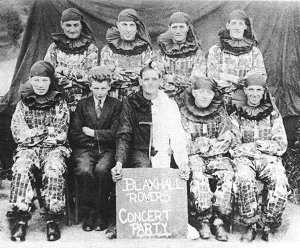 Well, our social club had accumulated a few bob - I don't know, maybe £50 - and to help out we arranged to give those families in a bad way tickets at the local grocery store, and it saved the day. So then we decided to raise a concert party from some of the chaps who could sing and so on - not to make money for ourselves but to try and get the money back we'd spent in case it ever happened again. And the local people backed us up to the hilt.
Well, our social club had accumulated a few bob - I don't know, maybe £50 - and to help out we arranged to give those families in a bad way tickets at the local grocery store, and it saved the day. So then we decided to raise a concert party from some of the chaps who could sing and so on - not to make money for ourselves but to try and get the money back we'd spent in case it ever happened again. And the local people backed us up to the hilt.
Now my father had Scottish blood in him and I've got a great affinity with anything Scottish - I've only got to hear the bagpipes and I'm off. Well, I used to do impersonations of Harry Lauder and Will Fyffe and sing comic songs like The Waggle of the Kilt and sentimental ones that my dad sang. One was an old Irish ballad Come back to Erin M'Bawn - now I sang that the other week at our club in Billericay (Essex), the first time since 1931 when I left Suffolk. I'd seen a concert party in Yarmouth and that gave us the idea for the costumes. Now Wicketts was the comedian - if they'd had TV then that man would have made a fortune. He was our leader.
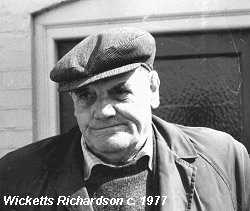 We normally started about October; the first one was always at Blaxhall and then we'd visit all the villages - sometimes three or four nights a week. Fred Taylor was our pianist - he was only a schoolboy then. The concert would always start with a full chorus, at least one song from each of us and encores if called for. Then after the interval another song each. Sometimes I had to round them up for the second half if they'd gone down the pub. Once my mother came to see us and she couldn't understand where I was in the second half - I'd gone down the Ship with Will Ling and we had our own concert there - forgot all about the Rovers. A chap called David Hudson from Glemham was our chauffeur. He had an old Model T Ford lorry which was normally used to cart sand and gravel from Blaxhall Pits, so we had to sweep it out and put in forms for us and a big blanket was hung over the back to keep the wind out.
We normally started about October; the first one was always at Blaxhall and then we'd visit all the villages - sometimes three or four nights a week. Fred Taylor was our pianist - he was only a schoolboy then. The concert would always start with a full chorus, at least one song from each of us and encores if called for. Then after the interval another song each. Sometimes I had to round them up for the second half if they'd gone down the pub. Once my mother came to see us and she couldn't understand where I was in the second half - I'd gone down the Ship with Will Ling and we had our own concert there - forgot all about the Rovers. A chap called David Hudson from Glemham was our chauffeur. He had an old Model T Ford lorry which was normally used to cart sand and gravel from Blaxhall Pits, so we had to sweep it out and put in forms for us and a big blanket was hung over the back to keep the wind out.
We only charged 5/- wherever we went and that went to the pianist, and the villages provided refreshments. Normally it was beer but we went to one church hall and the vicar's wife brought round coffee - well, we went back a year later and my cup of coffee was still there! Me and Percy used to black up with burnt cork, and our grease paint was a red stick marker the shepherds used to use during the breeding season to mark sheep. My mother used to swear at me if it hadn't all come off and went over the pillows!
Quotations in this chapter were from the following people:
Key: BS = Blaxhall Ship, Ftx = Folktracks, Trans = Transatlantic, Vet = Veteran Tapes, X = unissued
| Performer | Recorded | Title | Record |
|---|---|---|---|
| Eli Durrant | BS 1953 | Flash Company | Ftx FSB036 |
| John (Jack) French | BS 1953 | The Barley Mow Liverpool Play (The Dolphin) | BBC19882 BBC19883/ Ftx FSB036/ EMI 7EG8288 |
| Arthur Hewitt | BS 1953 | L.S.D. - (Landlord's Special Ditty) | Ftx FSB036 |
| Aldeman Ling | BS 1953 | The Maid and the Magpie | Ftx FSB036 |
| Fred Ling | BS 1953 | Nancy of Yarmouth | Ftx FSB036/ Topic 12T194 |
| Geoff Ling | BS 1953 BS 16.11.73 BS 17.12.74 Blaxhall 1980's | Maggie May Green Bushes Among My Souvenirs Green Bushes Died for Love Little Ball of Yarn/A Group of Young Squaddies/ On the Banks of the Clyde Among My Souvenirs/Man All Tattered and Torn Australia The Big Wheel Change the Old Love for the New You'll Want Me Back One Day Flash Company/Larks they Sang Melodious | Ftx FSB036 Trans 1141 Trans 1141 Topic 12TS292/ Topic TSCD 651 Topic 12TS292/ Topic TSCD 660 Topic 12TS292 Vet VT 106 Vet VT 103 Vet VT 101 Vet VT 104/ VTC1CD Vet VT 104 Vet VT 102 |
| George Ling | Croydon 28.4.75 | On Board the Leicester Castle Jolly Jack the Sailor The Lakes of Coolfin/The Deserter/ The Bonny Bunch of Roses/Nancy of Yarmouth | Topic 12TS292/ Topic TSCD 652 Topic 12TS292/ Topic TSCD 662 Topic 12TS292 |
| Fred Pearce (melodeon) | BS 1953 BS 1968 Blaxhall 1.12.74 | Step dance tune (Pigeon on the Gate,
with Peter Jay and Geoff Ling step-dancing) The Dolphin/Polka/Yarmouth Hornpipe Pigeon on the Gate/Yarmouth Hornpipe/ Barn Dance/Golden Slippers/ Cock of the North | BBC19884 Vet VTVS 05/06 Topic 12TS375 |
| Cyril Poacher | BS 1953 BS 16.11.73 Blaxhall Sept 1974 Blaxhall 1978? | Nutting Time The Nutting Girl (different version) The Broomfield Wager The Nutting Girl/Slap Dab Nancy of Yarmouth/Plenty of Thyme Maid and the Magpie Australia Bonny Bunch of Roses A Sailor and his True Love/A Broadside The Nutting Girl Broomfield Wager/Green Bushes/Bog Down in the Valley/Joe Moggins/Black Velvet Band/ Flash Company/I'm a Young Man from the Country/Your Faithful Sailor Boy Captain Ward | BBC19881/ EMI 7EG8288/ Ftx FSB036 Topic 12T158 Topic 12T160/ Ftx FSB036 Trans 1141 Topic 12TS252/ Topic TSCD 662 Topic 12TS252/ Topic TSCD 656 Topic 12TS252/ Topic TSCD 654 Topic 12TS252/ Topic TSCD 658 Topic 12TS252/ Topic TSCD 652 Topic 12TS252/ Topic TSCD 600 Topic 12TS252 Vet VT 108 |
| Wicketts Richardson | BS 1953 | Fagan the Cobbler | Topic 12T159 |
| Joe Rowe | BS 1953 | The Blackbird | Ftx FSB 036 |
| Bob Scarce | BS 1953 BS 16.11.73 BS 1973/4 | When Paddy Stole the Rope Newlyn Town Local Poaching Song General Wolfe The Bonny Bunch of Roses Three Jolly Sportsmen The Larks they Sang Melodious/ A Boy's Best Friend is his Mother A Broadside/Ratcliffe Highway/ The Burden of the Spray | BBC19881/ Ftx FSB036 Topic 12T195/ Ftx FSB036 Ftx FSB036 Topic 12T196/ Ftx FSB036 BBC19883 BBC19884/ Topic 12T195 Trans 1141 KS/Topic X |
| Arthur Smith | BS 1953 | A Sailor and his True Love/The Barley Mow | Ftx FSB036 |
| EMI (EP) | ||||
| • | 7EG8288 | The Barley Mow | Various (deleted) | |
| Folktracks (Cassette) | ||||
| • | FSB 036 | Down at Old Blaxhall Ship | Various | |
| Topic (LP) - all now deleted | ||||
| • | 12T 158 | Folk Songs of Britain Vol 2 | Songs of Seduction | |
| • | 12T 159 | Folk Songs of Britain Vol 3 | Jack of all Trades | |
| • | 12T 160 | Folk Songs of Britain Vol 4 | The Child Ballads Vol 2 | |
| • | 12T 194 | Folk Songs of Britain Vol 6 | Sailormen and Servingmaids | |
| • | 12T 195 | Folk Songs of Britain Vol 7 | Fair Game and Foul | |
| • | 12TS 252 | Cyril Poacher | The Broomfield Wager | |
| • | 12TS 292 | The Ling Family | Various | |
| • | 12TS 375 | Sing Say and Play | Various | |
| Topic (CD) | ||||
| • | TSCD 600 | Hidden English | Various | |
| • | TSCD 651 | Voice of the People Vol 1 | Come Let us Buy the Licence | |
| • | TSCD 652 | Voice of the People Vol 2 | My Ship Shall Sail the Ocean | |
| • | TSCD 654 | Voice of the People Vol 4 | Farewell my Own Dear Native Land | |
| • | TSCD 656 | Voice of the People Vol 6 | Tonight I'll Make You my Bride | |
| • | TSCD 658 | Voice of the People Vol 8 | A Story I'm Just About to Tell | |
| • | TSCD 660 | Voice of the People Vol 10 | Who's That at my Bed Window | |
| • | TSCD 662 | Voice of the People Vol 12 | We've Received Orders to Sail | |
| Transatlantic (LP) | ||||
| • | 1141 | The Larks they Sang Melodious | Various (deleted) | |
| Veteran (Cassette) | ||||
| • | VT 101 | Songs Sung in Suffolk Vol 1 | Comic Songs | |
| • | VT 102 | Songs Sung in Suffolk Vol 2 | Popular Folk Songs | |
| • | VT 103 | Songs Sung in Suffolk Vol 3 | Old Songs and Ballads | |
| • | VT 104 | Songs Sung in Suffolk Vol 4 | Those Sentimental Songs | |
| • | VT 106 | Songs Sung in Suffolk Vol 6 | More Comic Songs and Parodies | |
| • | VT 108 | The Horkey Load Vol 1 | Various | |
| • | VTVS 05/06 | Melodeon Players from E Anglia | The Pigeon on the Gate | |
| Veteran (CD) | ||||
| • | VTC1CD | Stepping it Out! | Various | |
In 1978 the company I worked for acquired a factory in County Fermanagh in Northern Ireland and I was sent there on a very regular basis to do their accounts for the next four years. On my return in 1982 I found that Suffolk had changed dramatically. Many of the old characters were gone and a great number of my friends and acquaintances had died. Indeed, Jumbo Brightwell, Fred Pearce and George Ling had all died within a week of each other. The pubs did not seem the same either - music was hard to find and I found the experience rather depressing.
In hindsight, the changes that I saw were probably not that great and my perceptions possibly exaggerated, having just returned from a musical paradise in rural Ireland. Clearly Suffolk's musical heritage was still intact during this period and well beyond, as witnessed by the remarkable research and enthusiasm of John Howson. However, when I visited the Ship to meet John earlier this year (1998), I commented that it was the first time I had been for sixteen years! I was very pleased that I did, for despite a few alterations the pub had lost little of its character, was being run by a sound man Jim Grubbs, an American, and the music, provided by John & Katie Howson, Reg Reeder and friends, was warmly received. Also Geoff Ling still sings there occasionally. He doesn't get out much in the evening - but if I were to come back the following lunchtime ...
Keith Summers - 3.11.98
Article MT025
| Top of page | Sing, Say or Pay Index | Part 2 | Part 3 | Part 4 |
| Articles | Home Page | Reviews | News | Editorial |